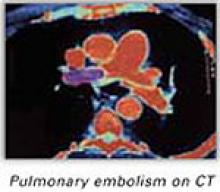User login
<court>Undisclosed County (Minn) District Court</court>
Complaining of lightheadedness, headache, poor appetite, dry cough, and shortness of breath, a 22-year-old woman presented to her physician, who diagnosed probable viral illness. She was on birth control pills and weighed 306 lb.
The patient was sent home and told to come back if symptoms persisted. Four days later, she returned with continued lightheadedness, chest rattle, and dry cough. Blood tests revealed an elevated white cell count. The physician attributed her symptoms to the viral illness.
The following day, the patient collapsed and exhibited signs of respiratory distress. She was rushed to the hospital, where her condition deteriorated into respiratory and cardiopulmonary arrest. Despite 30 minutes of cardiopulmonary resuscitation, the woman died. An autopsy revealed a pulmonary embolism.
The family argued that the woman’s obesity and use of birth control pills placed her at high risk for thromboembolism. They maintained that the doctor should have performed lung scans and other related tests to rule out pulmonary embolism. Had the embolism been discovered earlier, they argued, anticoagulation treatment could have saved her life.
- A $140,000 settlement was reached prior to filing suit.
The cases presented here were compiled by Lewis L. Laska, editor of Medical Malpractice Verdicts, Settlements & Experts. While there are instances when the available information is incomplete, these cases represent the types of clinical situations that typically result in litigation.
<court>Undisclosed County (Minn) District Court</court>
Complaining of lightheadedness, headache, poor appetite, dry cough, and shortness of breath, a 22-year-old woman presented to her physician, who diagnosed probable viral illness. She was on birth control pills and weighed 306 lb.
The patient was sent home and told to come back if symptoms persisted. Four days later, she returned with continued lightheadedness, chest rattle, and dry cough. Blood tests revealed an elevated white cell count. The physician attributed her symptoms to the viral illness.
The following day, the patient collapsed and exhibited signs of respiratory distress. She was rushed to the hospital, where her condition deteriorated into respiratory and cardiopulmonary arrest. Despite 30 minutes of cardiopulmonary resuscitation, the woman died. An autopsy revealed a pulmonary embolism.
The family argued that the woman’s obesity and use of birth control pills placed her at high risk for thromboembolism. They maintained that the doctor should have performed lung scans and other related tests to rule out pulmonary embolism. Had the embolism been discovered earlier, they argued, anticoagulation treatment could have saved her life.
- A $140,000 settlement was reached prior to filing suit.
The cases presented here were compiled by Lewis L. Laska, editor of Medical Malpractice Verdicts, Settlements & Experts. While there are instances when the available information is incomplete, these cases represent the types of clinical situations that typically result in litigation.
<court>Undisclosed County (Minn) District Court</court>
Complaining of lightheadedness, headache, poor appetite, dry cough, and shortness of breath, a 22-year-old woman presented to her physician, who diagnosed probable viral illness. She was on birth control pills and weighed 306 lb.
The patient was sent home and told to come back if symptoms persisted. Four days later, she returned with continued lightheadedness, chest rattle, and dry cough. Blood tests revealed an elevated white cell count. The physician attributed her symptoms to the viral illness.
The following day, the patient collapsed and exhibited signs of respiratory distress. She was rushed to the hospital, where her condition deteriorated into respiratory and cardiopulmonary arrest. Despite 30 minutes of cardiopulmonary resuscitation, the woman died. An autopsy revealed a pulmonary embolism.
The family argued that the woman’s obesity and use of birth control pills placed her at high risk for thromboembolism. They maintained that the doctor should have performed lung scans and other related tests to rule out pulmonary embolism. Had the embolism been discovered earlier, they argued, anticoagulation treatment could have saved her life.
- A $140,000 settlement was reached prior to filing suit.
The cases presented here were compiled by Lewis L. Laska, editor of Medical Malpractice Verdicts, Settlements & Experts. While there are instances when the available information is incomplete, these cases represent the types of clinical situations that typically result in litigation.
